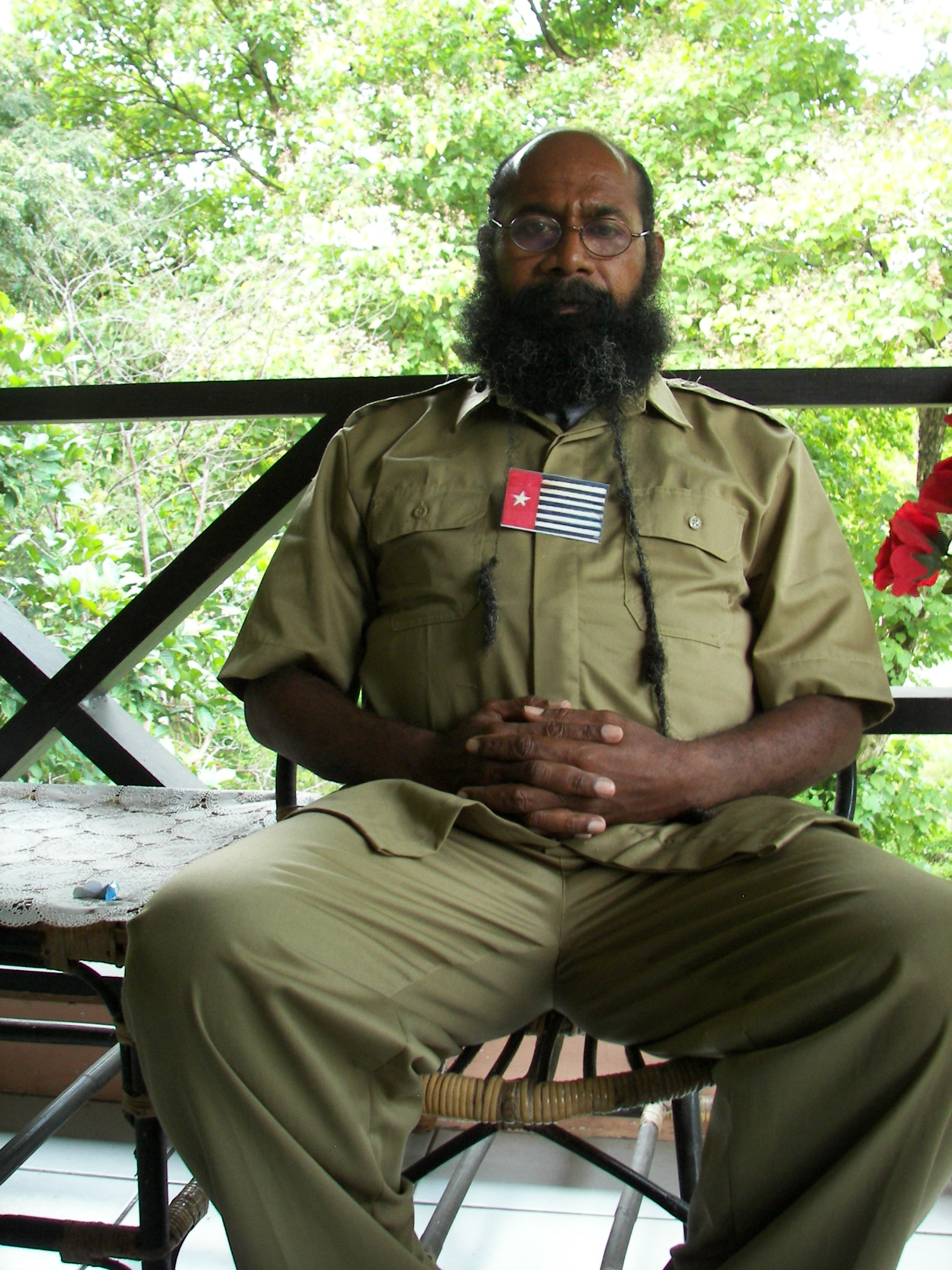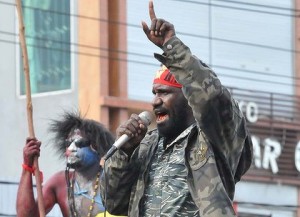Written by Eben Kirksey
West Papua is one of the most difficult places to access on the
planet. Still a steady trickle of adventurous travelers is being drawn
there by images of highlanders wearing penis sheaths and birds of
paradise. In the words of Lonely Planet
this place has a mystique that "piques the imagination of the
explorer... The diversity in lifestyle and culture of the indigenous
people, who speak more than 250 languages, is matched only by [the
area's] biodiversity and geography." Part of this mystique has been
created by the Indonesian government. According to the website
of their embassy in Washington D.C., West Papua is one of the "regions
in Indonesia that the foreign national is not allowed to visit without
special written permission and approval... Visitors who enter these
restricted regions without permission are subject to arrest, detention,
and will be prosecuted according to Indonesian law."
 |
| A man in a penis sheath from West Papua's highlands (Photograph: Eben Kirksey) |
It took me years of writing letters and making repeat visits to the Indonesian Embassy in Washington, before my application to be an undergraduate exchange student was approved in 1998. Weeks after receiving a much-coveted visa stamp, I found myself in the middle of a peaceful demonstration on the streets of West Papua. I stumbled upon an event that government officials tried to hide. Fourteen years ago today -- on July 6th, 1998 -- I was a bystander at a massacre.
The protest was led by Filep Karma, a Papuan leader who wants
independence from Indonesia. As the attack started, Karma roused his
followers, all unarmed civilians, with a hymn. They held hands, sitting
in a circle, under a water tower where their outlawed banner, the
Morning Star flag, flew. During the initial assault by Indonesian
police, military, and navy forces, Karma was shot twice -- once in each
leg -- but he survived the incident. Many of his followers were not so
fortunate and were killed instantly. A truck came to cart away the
bodies of the dead and dying. "I counted fifteen people in the first
load," one eyewitness told me. "The truck came a second time and I
counted seventeen people inside. When they opened up the truck bed I
could see lots of blood, in that small truck there was lots of blood,"
[Quoted from Kirksey, Freedom in Entangled Worlds,
49-50]. Human rights investigators could not determine what happened to
the dead and wounded people who were transported in this truck. Filep
Karma, who is now an Amnesty International prisoner of conscience, told
me about how to find one mass grave. But, forensic archaeologists have
not yet visited this site.

Filep Karma (Photograph by Eben Kirksey)
At the time I was hiding in Hotel Irian, a colonial era building, and I heard gun shots as security forces killed people. From my hotel window I saw Navy ships docked out in the harbor. Survivors of the initial assault were loaded onto these ships, taken out to open ocean, and dumped overboard to drown. One group investigating the incident concluded that "one hundred thirty-nine people were loaded on two frigates that headed in two directions to the east and to the west and these people were dropped into the sea," [Quoted in Kirksey, Freedom in Entangled Worlds, 48]. At least 32 decaying bodies later washed ashore. Elsham, an indigenous human rights organization, produced a 69-page report in Indonesian about the massacre titled "Names Without Graves, Graves Without Names." The report called for an international investigation, but no one has since followed up.
Indonesian officials routinely stymie human rights research in West
Papua. Amnesty International researchers were expelled from West Papua
in 2002 while investigating a separate massacre.
The United Nations Special Rapporteur for Extrajudicial, Summary, or
Arbitrary Executions formally asked to visit West Papua in 1994. This
request was denied. In 2004 the government also rejected the Rapporteur's follow-up request to visit Indonesia. Even the International Committee for the Red Cross, a moderate organization that is renowned for negotiating access to wartorn regions, has been banned.
Rather than wait in vain for help from the outside, help which might
never arrive, many Papuans are doing the work of human rights
themselves. Indigenous activists used the Internet to circulate a video in 2010
that showed the brutal torture and murder of a highland villager.
Last November, when thousands of West Papuans came together to declare
independence in a peaceful Congress, local human rights researchers used
their cell phones to give real-time updates and send video footage abroad.
Brave action on the ground by these activists helped prevent a
massacre on the scale that I witnessed in 1998. Last November,
Indonesian authorities knew that influential international leaders were
watching from afar.
Killings in West Papua have lately become more frequent, mysterious, and arbitrary. In a string of shootings
that has seemed to baffle regional government officials and
investigators, at least 19 people have been killed in recent weeks.
[Read accounts from the Jakarta Post on 7/2/12, 7/3/12 and 7/5/12.] Many more, including a German tourist,
have sustained bullet wounds. One Papuan leader, Mako Tabuni, held a
press conference on June 13th where he publicly asked the police to get
to the bottom of the shootings. "Only one local media outlet,
papuapos.com, dared to report on this press conference," according to a Facebook update
by Octovianus Mote, a Senior Human Rights Fellow at Yale Law School who
hails from West Papua's highlands. "Probably Mako didn't get a chance
to read the news story,"
the Facebook post continues, "because it was published the same morning
that uniformed police officers came to his house and killed him."
"The killing of Mr. Tabuni is a clear violation of international human rights law principles," wrote Franciscans International in a formal allegation to the United Nations last month. "This is a clear example of a targeted killing." As international organizations call attention to ongoing abuses, access to the region has become even more difficult. The Indonesian government recently requested that Scott Marciel, the Ambassador of the United States, reschedule a planned trip to West Papua. In response to my query about this aborted trip a U.S. State Department Spokesperson said:
Ambassador Marciel was not able to immediately reschedule his visit... [and] is committed to rescheduling his travel to Papua as soon as feasible. Limitations on access to Papua by foreign government officials, NGO personnel and journalists feed suspicions in the international community about government actions in those areas. We encourage the Indonesian government to take this into consideration when reviewing travel requests. The U.S. government condemns the recent violence in Papua and urges the Indonesian government to conduct full and transparent investigations into the incidents and allegations of excessive force on the part of the security forces.
Spectacular violence by Indonesia's security forces has long been
hidden in West Papua. But, the old tactics of terror are no longer
working. Smartphones and social media are allowing savvy indigenous
leaders to reach out to allies abroad and to spread audacious hopes
amongst their countrymen at home.
While travel guides intent on piquing the imagination of explorers
are still painting pictures of Papuans with an exotic brush, indigenous
activists are quietly formulating their own imaginative dreams. Papuans
are picturing sweeping changes on future horizons. They are imagining
an end to the current military occupation, a new era of justice and
freedom. Watching recent developments from afar, I have started to
expect the unexpected. Intrepid travelers who are willing to put up
with months of bureaucratic tedium, or who dare to defy unjust visa
policies, certainly stand a chance of learning about surprising
indigenous visions.
Eben Kirksey
earned his Ph.D. from the University of California-Santa Cruz and is
currently a Mellon Fellow at the CUNY Graduate Center in New York City.
His first book, Freedom in Entangled Worlds: West Papua and the
Architecture of Global Power, was published in April 2012 by Duke
University Press.
Piblished: http://www.huffingtonpost.com/










0 Komentar Anda:
Post a Comment
Your Comment Here